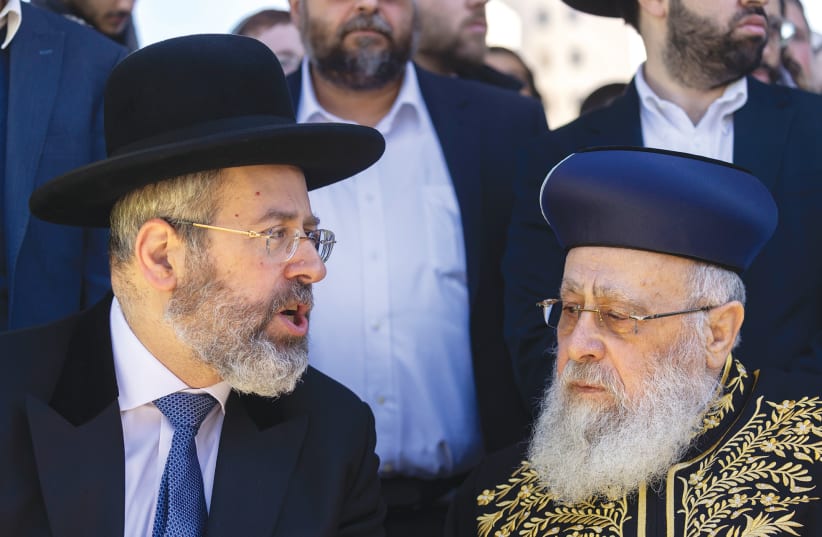The terms of Israel’s two chief rabbis, Ashkenazi Chief Rabbi David Lau and Sephardic Chief Rabbi Yizhak Yosef, expired on Monday. For the first time in its history – since the institution of the Chief Rabbi was formed in 1921– Israel does not currently have chief rabbis.
The expiration date passed amidst an ongoing legal and political saga with no end in sight.
Israeli law states that new chief rabbis must be elected at least 21 days before the end of their tenure. The Religious Services Ministry, however, failed to hold the election on time due to disagreements over the makeup of the statutory 150-member election body, which is responsible for electing both chief rabbis and the 15-member Chief Rabbinical Council.
The 70 elected officials include mayors, religious council leaders, two government and five Knesset representatives, and 10 public figures chosen by the religious services minister.
According to law, the body's makeup includes 80 rabbis and 70 elected officials. The 80 rabbis include municipal rabbis, neighborhood rabbis, representatives from the religious courts and the military rabbinate, and 10 rabbis elected by the outgoing chief rabbis.
Outgoing rabbis unable to appoint future representatives?
The Attorney-General's Office ruled last month that the outgoing rabbis could not appoint their 10 representatives since they had a conflict of interest. Both of them had family members who were interested in running for the position of chief rabbi. Two other members of the council were chosen instead.
Further complicating the matter is a High Court of Justice ruling in January. The verdict, on a petition by Bar-Ilan University's Rackman Center, which promotes the status of women in matters of family law and seeks to end gender discrimination and inequality in Israel, said that the 10 "rabbis" appointed by the outgoing chief rabbis, or in this case, their replacements, could include women. The High Court ruled that the outgoing rabbis, therefore, had to "consider" appointing some women who were halachic experts.
The two outgoing chief rabbis refused even to consider appointing women. They even initiated a ruling by the Chief Rabbinical Council in May that said that appointing women to spots reserved for "rabbis" was not halachically permissible.
The Rackman Center once again petitioned the High Court over what appeared to be the Chief Rabbinical Council ignoring the law, and the court heard the case this week, alongside two other petitions to force the religious affairs ministry to hold the election immediately. These latter two petitions were filed by Adv. Prof. Aviad Hacohen, and by a nonprofit organization ITIM: Resources and Advocacy for Jewish Life.
The electoral body can technically convene without the full 150 members and can appoint the next chief rabbis and council with as few as 80 members. Still, the court ruled that the stand-in chief rabbis had until July 7 to choose their 10 rabbis and reiterated that women needed to be "considered." The court did not say what would happen if this deadline was not met.
The issue has been further complicated by political and personal interests. Shas chairman MK Arye Deri has acted to appoint his brother Yehuda as the next Sephardi chief rabbi. In the meantime, Yehuda Deri is very ill, and his appointment is no longer relevant. Deri will likely support Rabbi David Yosef, the brother of the outgoing chief rabbi.
In the meantime, the Ashkenazi haredi parties are attempting to agree on a candidate for the position of Ashkenazi chief rabbi, while Religious Zionist Party chairman Bezalel Smotrich is trying to appoint a religious-Zionist chief rabbi for the first time.
Finally, further complicating the matter is the candidacy for the post of Sephardi chief rabbi of the chief rabbi of Safed and member of the outgoing Chief Rabbinical Council, Shmuel Eliyahu. Eliyahu is the father of Heritage Minister Amichai Eliyahu of the Otzma Yehudit Party – and the minister has reportedly acted in favor of his father's candidacy.

